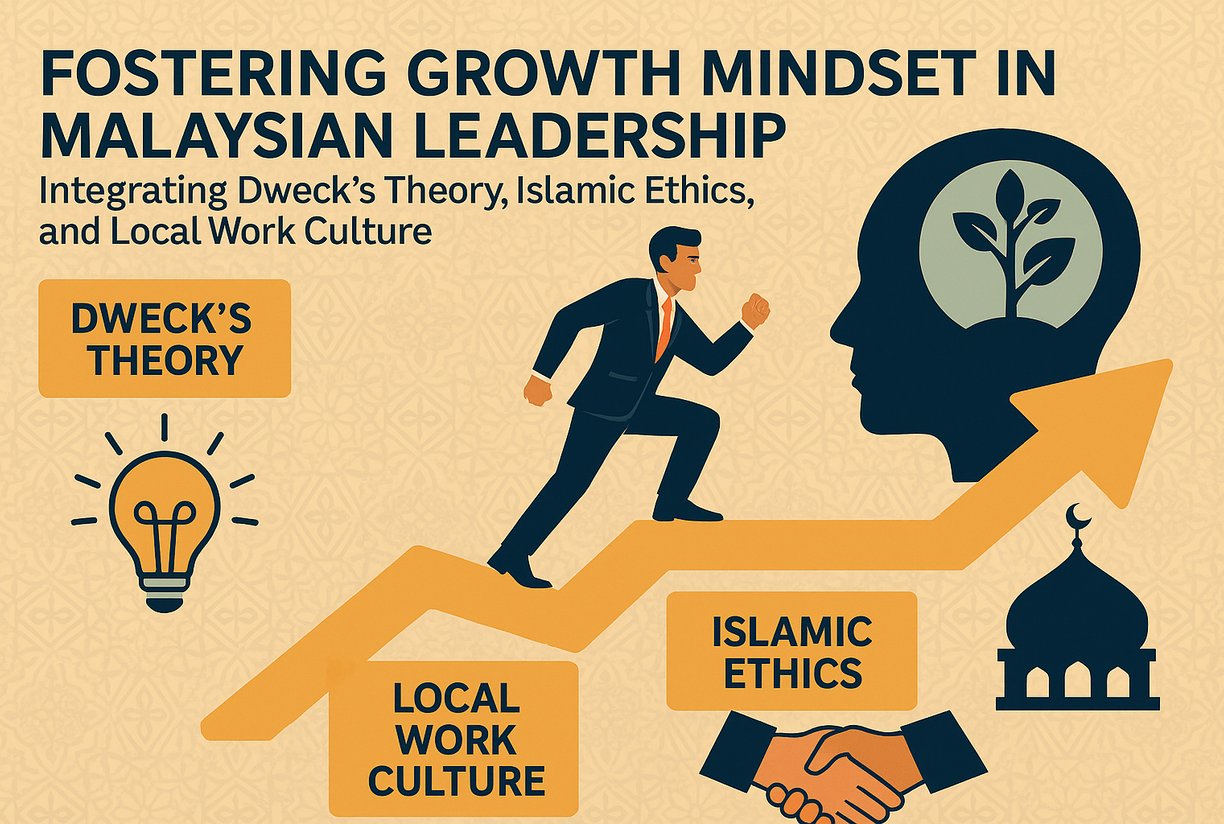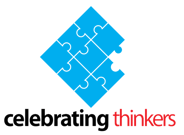Fostering Growth Mindset in Malaysian Leadership: Integrating Dweck’s Theory, Islamic Ethics, and Local Work Culture
Written by
Fatimah Abu Bakar


1. Introduction
Leadership in Malaysian organizations is at a critical inflection point. As the global business landscape evolves rapidly, the ability to adapt, learn, and innovate becomes paramount. Yet, many organizations still grapple with deeply entrenched leadership mindsets that resist change, discourage experimentation, and penalize failure. At the heart of this issue is what Carol Dweck (2006) famously termed the “fixed mindset” — the belief that abilities are innate and static .
To drive sustainable growth, there is a need for leaders who embody a growth mindset — those who view challenges as opportunities, embrace continuous learning, and inspire others to reach higher. This article explores how Malaysian leaders can cultivate such a mindset, using Dweck’s psychological framework, harmonized with Islamic principles and Malaysian work ethics, particularly the Islamic notion that “work is an act of worship” (العمل عبادة).
2. Fixed vs Growth Mindset: The Dweck Model
Carol Dweck’s seminal work posits two basic mindsets:
Fixed Mindset Growth Mindset
Believes intelligence and talent are static. Believes abilities can be developed
Avoids challenges Embraces challenges
Gives up easily Shows persistence
Sees effort as fruitless Sees effort as path to mastery
Ignores useful feedback Learns from criticism
Threatened by others’ success Finds inspiration in others’ success
Leaders with a fixed mindset often foster hierarchical, fear-based environments. In contrast, growth-minded leaders nurture psychological safety, learning, and innovation — key ingredients for thriving organizations (Dweck, 2006).
3. Fixed Mindset in Malaysian Leadership Culture
Malaysian organizations, influenced by Confucian heritage culture and colonial administrative legacies, often emphasize hierarchy, seniority, and face-saving. These cultural traits, while useful in maintaining respect and order, may also discourage questioning, feedback, and risk-taking — thereby reinforcing a fixed mindset.
Furthermore, fear of failure, often tied to social stigma or job security, can deter leaders from venturing into unknown territories or encouraging creativity among subordinates.
4. Islamic Principles: Work as Worship and the Ethic of Excellence
Islamic teachings offer a powerful lens through which to cultivate a growth mindset, rooted in the concepts of intentionality, excellence (ihsan), and continuous self-improvement (jihad al-nafs)
Key Islamic Principles Supporting Growth Mindset
Work is Worship:
“And say, ‘Do [good] work, for Allah will see your deeds, and [so will] His Messenger and the believers…”
(Qur’an, 9:105)
This verse affirms that all work done with sincerity and excellence becomes an act of worship (ibadah).
Pursuit of Knowledge:
“Allah will raise those who have believed among you and those who were given knowledge, by degrees.”
(Qur’an, 58:11)
Continuous learning and seeking knowledge are divine imperatives.
Striving for Excellence (Ihsan):
“Verily, Allah loves that when anyone of you does a job, he should perfect it.”
(Hadith - Al-Bayhaqi)
This aligns seamlessly with Dweck’s idea that effort and mastery are virtues to be embraced.
Overcoming the Ego (Jihad al-Nafs):
The internal struggle to overcome pride, fear, or laziness mirrors the mindset shift from fixed to growth.
Islam, therefore, not only supports but commands a mindset of growth, excellence, and humility — all essential for effective leadership.
5.Strategies to Encourage Growth Mindset in Malaysian Leadership
To shift leadership culture, we must align psychological insights with cultural and religious values. Here’s how:
a. Reframe Failure as Learning
Dweck: Mistakes are learning opportunities.
Islamic view: “Every son of Adam commits sin, and the best of sinners are those who repent” (Tirmidhi). Fallibility is human, and redemption is in correction and grow
b. Lead with Purpose (Sinek’s “Why”)
Simon Sinek: Start with why — purpose-driven leadership inspires commitment.
Islamic alignment: “Actions are judged by intentions” (Hadith - Bukhari & Muslim). Leaders should model sincerity (ikhlas) and purpose (niyyah).
c. Promote Lifelong Learning
Encourage leaders to model curiosity and continuous learning.
Institutionalize reflective practices (e.g., muhasabah, self-accountability).
Integrate mentorship programs, encouraging knowledge as sadaqah jariyah (continuous charity).
d. Embed Feedback into Culture
Shift from top-down evaluations to 360-degree feedback.
Create psychologically safe environments where critique is constructive, not punitive.
e. Recognize Effort, Not Just Talent
Praise resilience, learning, teamwork, and progress.
Use recognition systems that align with Islamic values of justice and reward.
6. Conclusion
In the fast-evolving Malaysian economy, leadership must transcend transactional metrics and instead embrace transformation through mindset. Carol Dweck’s growth mindset model provides a psychologically robust foundation — but when interwoven with Islamic ethics and the Malaysian socio-cultural fabric, it becomes a spiritually compelling call to action.
The Qur’an and Sunnah are replete with reminders that excellence, persistence, learning, and humility are the traits of the righteous — and of the effective leader. From reframing failure as growth to seeing work as ibadah, Malaysian leaders have a unique opportunity to lead with both intellect and soul.
To eradicate the fixed mindset:
Infuse leadership development with faith-driven purpose.
Encourage humble, reflective, and feedback-rich environments.
Model the journey of lifelong learning as an act of worship.
Let us raise a generation of Malaysian leaders who strive for ihsan, embrace growth, and inspire with intention — not just for profit, but for purpose.
References & Citations
Islamic Sources
Qur’an 9:105 – “And say, Do [good] work…”
Qur’an 58:11 – “Allah will raise those who have believed among you…”
Hadith – “Verily, Allah loves that when any of you does a job, he should perfect it.” (Al-Bayhaqi)
Hadith – “Actions are judged by intentions…” (Bukhari & Muslim)
Hadith – “The strong believer is better and more beloved to Allah…” (Muslim)
Hadith – “Every son of Adam sins…” (Tirmidhi)
Western Sources
Dweck, C. S. (2006). Mindset: The New Psychology of Success. Random House.
Sinek, S. (2009). Start With Why: How Great Leaders Inspire Everyone to Take Action. Portfolio.
Edmondson, A. (2019). The Fearless Organization: Creating Psychological Safety in the Workplace for Learning, Innovation, and Growth. Wiley.
Get in touch
Address
43-1 Jalan 7/7 Seksyen 7, Bandar Baru Bangi 44650, Selangor Darul Ehsan
